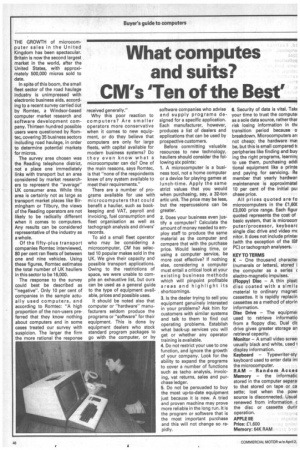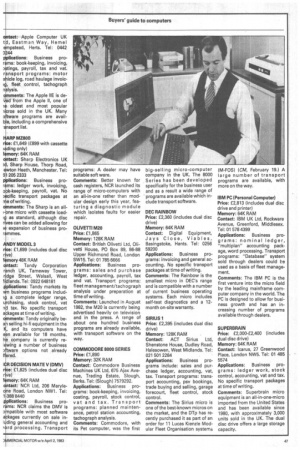What computes and suits?
Page 44

Page 45

If you've noticed an error in this article please click here to report it so we can fix it.
CM's 'Ten of the Best'
THE GROWTH of microcomputer sales in the United Kingdom has been spectacular. Britain is now the second largest market in the world, after the United States, with approximately 500,000 micros sold to date.
In spite of this boom, the small fleet sector of the road haulage industry is unimpressed with electronic business aids, according to a recent survey carried out by Romtec, a Windsor-based computer market research and software development company. Thirteen hundred possible users were questioned by Romtec, covering 35 business sectors including road haulage, in order to determine potential markets for micros.
The survey area chosen was the Reading telephone district, not a place one immediately links with transport but an area considered by market researchers to represent the "average" UK consumer area. While this area is certainly not as large as transport market places like Birmingham or Tilbury, the views of the Reading operators are not likely to be radically different when it comes to computers. Any results can be considered representative of the industry as a whole.
Of the fifty-plus transport companies Romtec interviewed, 80 per cent ran fleets of between one and nine vehicles. Using these figures, Romtec estimates the total number of UK hauliers in this sector to be 16,000.
The response to the survey could best be described as '"negative". Only 10 per cent of companies in the sample actually used computers, and according to Romtec: "A high proportion of the non-users preferred that they know nothing about computers and in some cases treated our survey with suspicion. The larger the firm the more rational the response received generally."
Why this poor reaction to computers? Are smaller operators more conservative when it comes to new equipment, or do they believe that computers are only for large fleets, with capital available for modern business systems? Do they even know what a microcomputer can do? One of the main reasons, says Romtec, is that "none of the respondents knew of any system available to meet their requirements."
There are a number of programs available for use with microcomputers that could benefit a haulier, such as bookkeeping and VAT, payroll and invoicing, fuel consumption and fleet organisation as well as tachograph analysis and drivers' records.
To aid a small fleet operator who may be considering a microcomputer, CM has selected 10 popular makes sold in the UK. We give their capacity and possible transport applications. Owing to the restrictions of space, we were unable to compile an exhaustive list, but ours can be used as a general guide to the type of equipment available, prices and possible uses.
It should be noted also that computer or "hardware" manufacturers seldom produce the programs or "software" for their equipment. This is done by equipment dealers who stock standard program packages to go with the computer, or by software companies who advise and supply programs designed for a specific application. Each manufacturer, however, produces a list of dealers and applications that can be used by prospective customers.
Before committing valuable resources to new technology, hauliers should consider the following six points: 1. A microcomputer is a business tool, not a home computer or a device for playing games at lunch-time. Apply the same strict values that you would when purchasing, say, a 32-ton artic unit. The price may be less, but the repercussions can be greater.
2. Does your business even justify a computer? Calculate the amount of money needed to employ staff to produce the same material as the computer and compare that with the purchase price. Would leasing time, or using a computer service, be more cost effective? If nothing else, considering a computer must entail a critical look at your existing business methods which will pinpoint profitable areas and highlight its shortcomings.
3. Is the dealer trying to sell you equipment genuinely interested in your problems? Ask him for customers with similar systems and talk to them to find out operating problems. Establish what back-up services you will get or whether any operator training is available.
4. Do not restrict your use to one function, and ignore the growth' of your company. Look for the ability to expand the programs to cover a number of functions such as tacho analysis, invoicing, vat returns, sales and purchase ledger.
5. Do not be persuaded to buy the most up-to-date equipment just because it is new. A tried and proven machine may prove more reliable in the long run. It is the program or software that is the most important purchase and this will not change so rapidly. 6. Security of data is vital. Talc( your time to trust the compute' as a sole data source, rather thar risk losing information in th( transition period because o breakdown. Microcomputers arl not cheap; the hardware ma) be, but this is small compared tc peripheries like finding and buy ing the right programs, learninl to use them, purchasing addi tional equipment like a printe and paying for servicing. Re member that yearly hardwan maintenance is approximatel 10 per cent of the initial put chase price.
All prices quoted are fo microcomputers in the £1,60( £3,000 price range. Each figur quoted represents the cost of basic system, that is microcorr puteriprocessor, keyboarc single disc drive and video mc nitor. It does not include printer (with the exception of the MP PC) or tachograph analysers.
KEY TO TERMS K — One thousand character (numerals or letters), stored i the computer as a series c electro-magnetic impulses. (Floppy) Disc — A thin plasti disc coated with a simile material to ordinary magneti cassettes. It is rapidly replacin cassettes as a method of stormn information.
Disc Drive — The equipmer used to retrieve informatio from a floppy disc. Dual dis drive gives greater storage an retrieval capacity.
Monitor — A small video screei usually black and white, used t display information.
Keyboard — Typewriter-styl keyboard used to enter data in1 the microcomputer.
RAM — Random Acces Memory — the informatic stored in the computer separai to that stored on tape or ca sette; lost when the pow source is disconnected. Usual renewed from information c the disc or cassette durir operation.
APPLE IIE Price: £1,600 Memory: 64K RAM
• et: Apple Computer UK ti, Eastman Way, Hemel mpstead, Herts. Tel: 0442 D'44
plications: Business pro
ms: book-keeping, invoicing, 3 tings, payroll, tax and vat. r nsport programs: motor 3 icle log, road haulage invoic
i , fleet control, tachograph n lysis.
mments: The Apple IIE is da d from the Apple II, one of oldest and most popular ros sold in the UK. Many D are programs are availb e, including a comprehensive nsport list.
RP MZ8OB r a: E1,649 (£899 with cassette ding only) I mory: 64K RAM ntact: Sharp Electronics UK I', Sharp House, Thorp Road, wton Heath, Manchester. Tel: 5 205 2333 lications: Business proms: ledger work, invoicing, • k-keeping, payroll, vat. No ) cific transport packages at e of writing.
• ments: The Sharp is an all ne micro with cassette load as standard, although disc 11 es can be added allowing for expansion of business pror mmes.
• NOY MODEL 3 r ce: £1,699 (includes dual disc r ye) I mory 48K RAM • ntact: Tandy Corporation r nch UK, Tameway Tower, r dge Street Walsall, West dands. Tel: 0922 648181 • plications: Tandy markets its n business programs includa complete ledger range, urchasing, stock control, vat I tax. No specific transport • kages at time of writing. • ments: Tandy originally bea selling hi-fi equipment in the and its computers have e n available for 18 months. h company is currently re
wing a number of business 3 are options not already
red.
Ii R DECISION MATE V (DMV) ce: £1,825 (indludes dual disc r e) I mory: 64K RAM • nthct: NCR Ltd, 206 Marylene Road, London NW1. Tel: 1 388 8440 plications: Business pror ms: NCR claims the DMV is • patible with most software a kages currently on sale En ding general accounting and rd processing. Transport programs: A dealer may have suitable soft ware.
Comments: Better known for cash registers, NCR launched its range of micro-computers with an all-in-one rather than modular design early this year, featuring a diagnostic module which isolates faults for easier repair.
OLIVETTI M20 Price: E1,865 Memory: 128K RAM Contact: British Olivetti Ltd, Olivetti House, PO Box 89, 86-88 Upper Richmond Road, London SW15. Tel: 01 785 6666 Applications: Business programs: sales and purchase ledger, accounting, payroll, tax and vat. Transport programs: fleet management/tachograph analysis under preparation at time of writing.
Comments: Launched in August 1982, the M20 is currently being advertised heavily on television and in the press. A range of about one hundred business programs are already available, with transport software on the way.
COMMODORE 8000 SERIES Price: £1,890 Memory: 32K RAM Contact: Commodore Business Machines UK Ltd, 675 Ajax Avenue, Trading Estate, Slough, Berks. Tel: (Slough) 7579292. Applications: Business programs: book-keeping, invoicing, costing, payroll, stock control, vat and tax. Transport programs: planned maintenance, petrol station accounting, tachograph analysis.
Comments: Commodore, with its Pet computer, was the first big-selling micro-computer company in the UK. The 8000 Series has been developed specifically for the business user and as a result a wide range of ' programs are available which include transport software.
DEC RAINBOW Price; £2,360 (includes dual disc drive) _Memory: 64K RAM Contact: Digital Equipment, Jays Close, Viables, Basingstoke, Hants. Tel: 0256 59200 Applications: Business programs: invoicing and general accounting. No specific transport packages at time of writing. Comments: The Rainbow is the smallest micro in DEC's range and is compatible with a number of current business operating systems. Each micro includes self-test diagnostics and a 12month on-site warranty.
SIRIUS Price: £2,395 (includes dual disc drive) Memory: 128K RAM Contact: ACT Sirius Ltd, Shenstone House, Dudley Road, Halesowen, West Midlands. Tel: 021 501 2284 Applications: Business programs include: sales and purchase ledger, accounting, vat, tax. Transport programs: transport accounting, psv bookings, trade buying and selling, garage forecourt, fleet control, stock control.
Comments: The Sirius micro is one of the best-known micros on the market, and the DTp has recently purchased it as part of an order for 11 Lucas Kienzle Modular Fleet Organisation systems IBM PC (Personal Computer) Price: £2,813 (includes dual disc drive and printer) Memory: 64K RAM Contact: IBM UK Ltd, Rockware Avenue, Greenford, Middlesex. Tel: 01 578 4399 Applications: Business programs: nominal ledger, "multiplan" accounting package, word processing. Transport programs: "Database" system sold through dealers could be used as a basis of fleet management.
Comments: The IBM PC is the first venture into the micro field by the leading mainframe computer company in the world. The PC is designed to allow for business growth and has an increasing number of programs available through dealers.
SUPERBRAIN Price: £2,000-£2,400 (includes dual disc drive) Memory: 64K RAM Contact: Icarus, 27 Greenwood Place, London NW5. Tel: 01 485 5574 Applications: Business programs: ledger work, stock control, accounting, vat and tax. No specific transport packages at time of writing.
Comments: Superbrain micro equipment is an all-in-one-micro imported from the United States and has been available since 1980, with approximately 3,000 units sold in the UK. The dual disc drive offers a large storage capacity.












































































